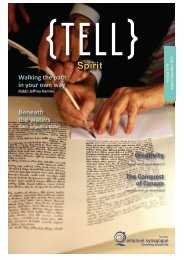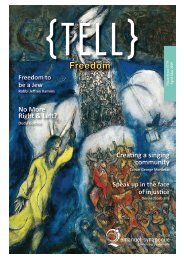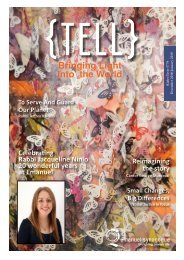TELL magazine: December 2020 - Emanuel Synagogue
The magazine of Emanuel Synagogue, Woollahra, Australia
The magazine of Emanuel Synagogue, Woollahra, Australia
You also want an ePaper? Increase the reach of your titles
YUMPU automatically turns print PDFs into web optimized ePapers that Google loves.
by Suzanna Helia
It is 4 in the morning, and I am
enjoying a ‘Facetime’ conversation
with my son in Switzerland. Our
conversations vary - sometimes they
are only for a few minutes, to let me
know he is okay, or that he needs some
shirts or stationery; lately however I
realised that we have started enjoying
longer conversations. I listen to him
practising violin, or we might work
together on his drawing assignments.
Sometimes, after speaking with him
for more than an hour, I see his brother
playing a video game with him while
on the phone. What I am discovering
is that although I am completely
devastated by the fact that he is not
here with us in Sydney, I realise that in
all that sadness of separation, distance
and “the void of him not being here”,
I have found some tangible benefits.
Similarly, I have discovered the
benefits of the world turning
digital; I have been looking into
the implications for the Jewish
community world-wide adopting
the digital space. It seems that the
Jewish community with the largest
population today is not in Jerusalem
or New York City, but the ‘digital’
Jewish community, with a population
numbering many, many millions.
Historically, the way Jewish
communities evolved and were
identified were often by their location.
Members of a synagogue and those
living nearby tended to build a
community. Jews used to live in
ghettos and in small geographical
locations in parts of cities. Yet the
digital space suddenly disrupted
this function completely and has
opened up new opportunities.
The question is - ‘how will our children
and grandchildren think about this?’
Will they belong to a synagogue
based on location, where they have
family and friends, or will they join
a synagogue that focuses on the
most fulfilling aspects of their Jewish
{CEO UPDATE}
beliefs, independent of the country,
location or the place they call home?
So, is this an opportunity to craft
early versions of digital Jewish
experience, that potentially grow into
fully formed expressions of Judaism
in the coming decades and centuries?
If we did, we would have to redefine
the meaning of a community. Do
we have an opportunity to create
digital communities based on similar
interests - supporting each other or
sharing the same background, and
at the same time address some social
issues that so many are dealing with?
But if community refers to a set of
people who are interested in gathering
together, supporting one another,
sharing life’s moments of sadness and
joy, and marking important occasions
and festivals together, that should be
achievable online. We just have to
wholly commit to that task as a Jewish
collective, in order to make it a reality.
Here in Australia we are now
standing on the brink of the victory
over the virus. It is hard to believe
that the world will be going back to
the ‘way before’; that we will now
switch off the streaming of services,
or that the digital platforms we
have built will now be closed down.
During the High Holy Days, we
experienced the benefit of bringing
grandparents from Los Angeles,
or cousins from London, to the
experience of our service or dinner,
for free. I don’t believe we will now
be content to only gather with
folks who live nearby, or are able
to travel to. Not to mention the
advantages for the members of
our families and community with
disabilities and in aged care homes.
Jews who live in places without
Jewish institutions will continue to
want digital opportunities for Jewish
engagement. I believe the times we
are living in right now, will mark a
point in the history of Jewish culture
and evolution. I see an opportunity
for early adopters to really make
a mark and become a strong and
most importantly relevant Jewish
community.
Once we have experienced the benefit
of sharing a lifecycle event through
digital streaming, in addition to
having a digital memory or video
available to view for the lifetime of
the Bar Mitzvah boy, for example, I
believe the face to face experience will
from now on always be supplemented
by the digital and virtual space.
At this moment, someone is
organising to change a law or fight
for those without a voice. Someone is
delivering a meal to a person in need.
And someone is simply searching
for a way to get involved in our
community. It will be fascinating
to see how well we will master this
digital trajectory that, to my mind, is
an extraordinary opportunity.
7















